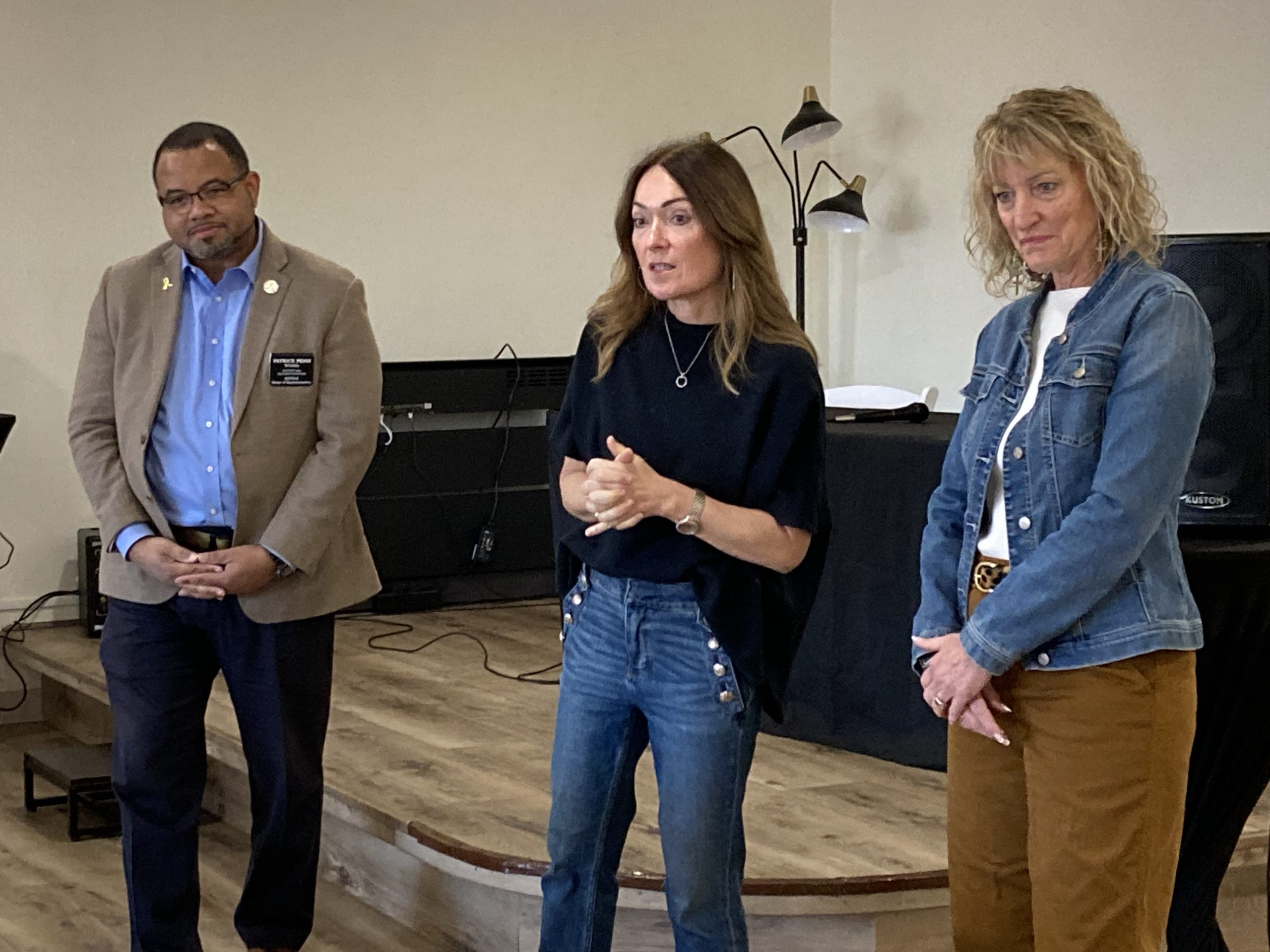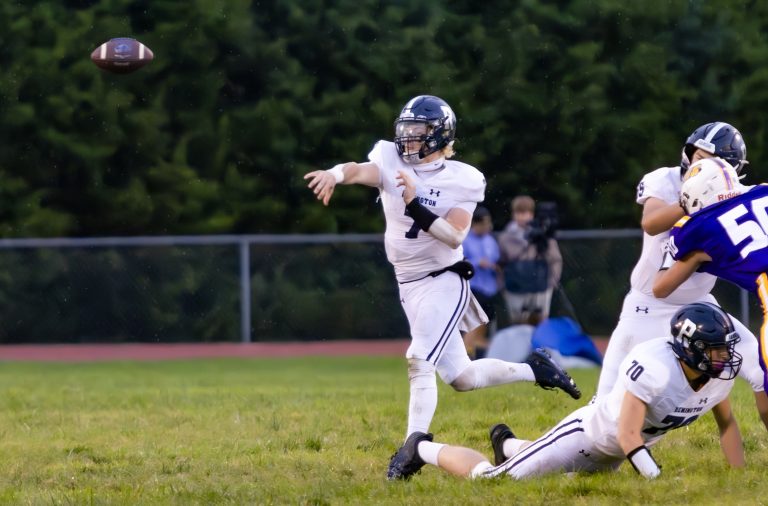Nikole Babb
nbabb@cherryroad.com
During the second 2025 Legislative Coffee on March 1, Kansas House Representatives Kristey Williams, Susan Humphries and Patrick Penn were present to discuss issues of concern with area residents. The meeting took place at the Andover Music Scene in conjunction with the Butler County Farm Bureau Association and Andover Area Chamber of Commerce.
About 15 people were in attendance of the event, which is usually attended heavily. The lower attendance rate was due to a miscommunication between the Farm Bureau, Andover Chamber of Commerce and the Times-Gazette. The time was initially dispersed by the Farm Bureau as 9-11am but was advertised by the Chamber as 8-10am, which wasn’t realized by other parties until last minute. Efforts to correct and update the times to 8-10am were made, but mistakes do happen and often are still difficult to get to everyone, even in this digital age.
Due to the confusion, another Legislative Coffee has been scheduled for March 15 at the same time and same place. Details will be noted at the end of the story.
All residents came ready to hold real dialogue with their local politicians and receive answers. Coffee, donuts and water were served to all who came. Each attendee was encouraged to introduce themselves and say what they came to talk about before representatives gave introductions and began to hold conversations over said topics.
Property taxes
Representative Williams took on the complicated conversation of local and state property taxes and how valuations and assessments work through county and local budgets. She then went on to talk about a current pending bill that would cap county valuations on property at 3% each year. She says she supports it and that it’s good because it creates transparency at the local level.
Although this cap won’t stop the budgets and mill levies from going up – that can only be stopped by local influence and local commission or council. Representative Williams explained that she once vocalized to Butler Community College about 5-6 years ago with a group of 16 that they didn’t want the taxes to be higher – and they listened and lowered the taxes. She emphasized that advocacy for self and others at the local level matters when wanting to address such things with the county and city one lives in.
“I have four children,” said Representative Williams. “This was six years ago, at least, when we went to BCC, and I decided I’m gonna call, and I reached out, and I got it, (the group together). And so, even if every person, even if you don’t do a just one person going, and then the next time, maybe five people will go, and you have to do that. I don’t know how else to do it.”
A couple of residents in the crowd confided that they’d gone with a small group, but nothing was done and agreed they need a big group to attend the meetings with.
“The best solutions are local,” said Representative Williams. “And if we don’t elect people locally that will not raise your taxes, they will continue to spend us out. We can’t policy our way out of this.”
As taxes from Butler Community College were brought up, Representative Williams echoed her earlier advice, which was to petition and show up to the college’s hearings in protest. She also insinuated that there was a conflict of interest between the Times-Gazette and reporting on Butler Community College taxes and budget due to their advertising through the Times-Gazette.
It was generally agreed upon that more information on city, county, public school and the college’s budget and taxes are wanted to be known in the paper, through their local Homeowner Associations, Chamber of Commerce, and other entities.
School vouchers and education
One resident mentioned their priority topic for the town hall was school vouchers, although the language for vouchers had been agreed upon to be called tax credits and educational savings accounts, (ESA), during the meeting instead.
Representative Williams stated that all of Butler County’s delegation is 100% in support of student and parent choice.
“And just so you’ll know, all of us, all of Butler County delegation, 100% are supportive of student and parent choice,” said Williams. “Very, very, very, very much in favor of that. And it is not mutually exclusive with public schools.”
Representative Penn echoed Williams’ words in support of ESAs and tax credits.
“Now, that said, we don’t do vouchers,” said Representative Penn. “We have done educational savings accounts. We’ve set that bill up, and that’s a choice that you can do. I don’t believe in top- down education, where one size must fit all, as I’ve discussed earlier.”
He continued to speak on how it affects taxes, saying that 51 cents of every tax dollar in the state of Kansas goes to K- 12 education. Additionally, he added that 10 cents of every tax dollar goes to the Board of Regents, or state-funded universities.
“You guys talk about property tax relief?” said Representative Penn. “This is why you can’t get none. Because the school system has us in a stranglehold. We have 62 cents of every one dollar that you send that we dig into your and take up for taxation, 62 cents of every tax dollar goes to education.”
Representatives Williams picked back up on the connotation of allowing children to be taught differently.
“It is not about, yes, I’m going to show you how we’re not doing as well as we can, but really it’s about the the format in which you want to receive the education,” said Representative Williams. “Every child is different and I actually think that some kids are going to need, and I was laughed at by a whole room of people when I said this before, but I’m going to say it again, some kids are going to need a lot of Jesus during that day and that’s what that’s what they’re going to need and they’re not going to get that in a public school. they’re going to get loving, caring teachers that love Jesus, yes, but they’re not going to get actual instruction teaching around that concept and so if a child needs that they should be able to have that and it is available for not just your typical schools”
Medicaid expansion
The topic of expanding Medicaid in Kansas has been a controversial topic that Republicans have fought against heavily the last several years and a goal of Governor Laura Kelly’s to pass before she termed out of her position. Representative Williams began the conversation by saying she doesn’t support the expansion due to able-bodied individuals not being covered by it if they work full-time for more than $10/hr or make more than $15,600. She also stated that waitresses make on average $50,000 a year, which the Times-Gazette cannot verify at this time.
Expansion would extend eligibility to people who earn up to 138% of the federal poverty level, which would cover those that are currently in the “coverage gap”, or individuals or families that make to much to be covered or too little to enroll into private health insurance. Kansas is one of nine states that hasn’t expanded eligibility since it was made available in 2010. Several residents in attendance urged the representatives to expand Medicaid for the working residents that aren’t wealthy and need coverage. Representative Humphries added that she believes there are better ways to utilize state money than expanding Medicaid, such as Federally Qualified Health Centers.
As discussions became heated, Representative Penn chimed in with his perspective on the federal-state match required from Medicaid. Currently, Kansas pays for 38% of Medicaid while the federal government matches 62%. With the expansion proposed, Kansas would pay 10% and federal would pay 90%.
“Because if we were to start it, if you were to put that taste on the tongue and right now the federal match, right now, as it’s currently set up, we do 10% the feds out of DC, after they tax you, and everybody else, and every other state, and send it all to the crockpot in and then with the crockpot, send it back down here,” said Representative Penn. “The problem that we have is they are going to stop that funding. If they don’t renew that, we started here at 10%. Everybody wants to stay on it. They pull the rug from under you in DC, the largest stops. And now, how do we match that 90% that we still have to pay for, when you’re 750 million in the hole?”
Representative Humphries mentioned her concern of the federal government changing their matching rates in the future after Kansas sets to expand, leaving the state in distress.
“In the last month, they’ve talked about changing that ratio already,” said Representative Humphries. “So, this would be a terrible time to expand Medicaid, actually, because we didn’t. And now would be a really unfortunate time to do it, because if that changes, we’re going to be in dire straits.”
Future meetings
The next Legislative Coffee will be held on March 15 in Andover from 8-10am. The town hall will be hosted at the Andover Music Scene located at 546 N Andover Road in Andover. Those in attendance will include Kansas House Representatives Susan Humphries and Sandy Pickert.
After the Andover event, Augusta will host one on Saturday, March 22 at the Train Depot located at 618 State Street in Augusta. The event will be co-hosted by Go!Augusta and runs from 9-11am. Legislators in attendance include Kansas Senator Larry Alley and Kansas House Representatives Doug Blex, Sandy Pickert and Kristey Williams.
An event in Benton has been added to the lineup and will be hosted Saturday, March 29. The event will be hosted at the Benton Community Building located at 150 S Main from 9-11am. In attendance will be Representative Patrick Penn.




